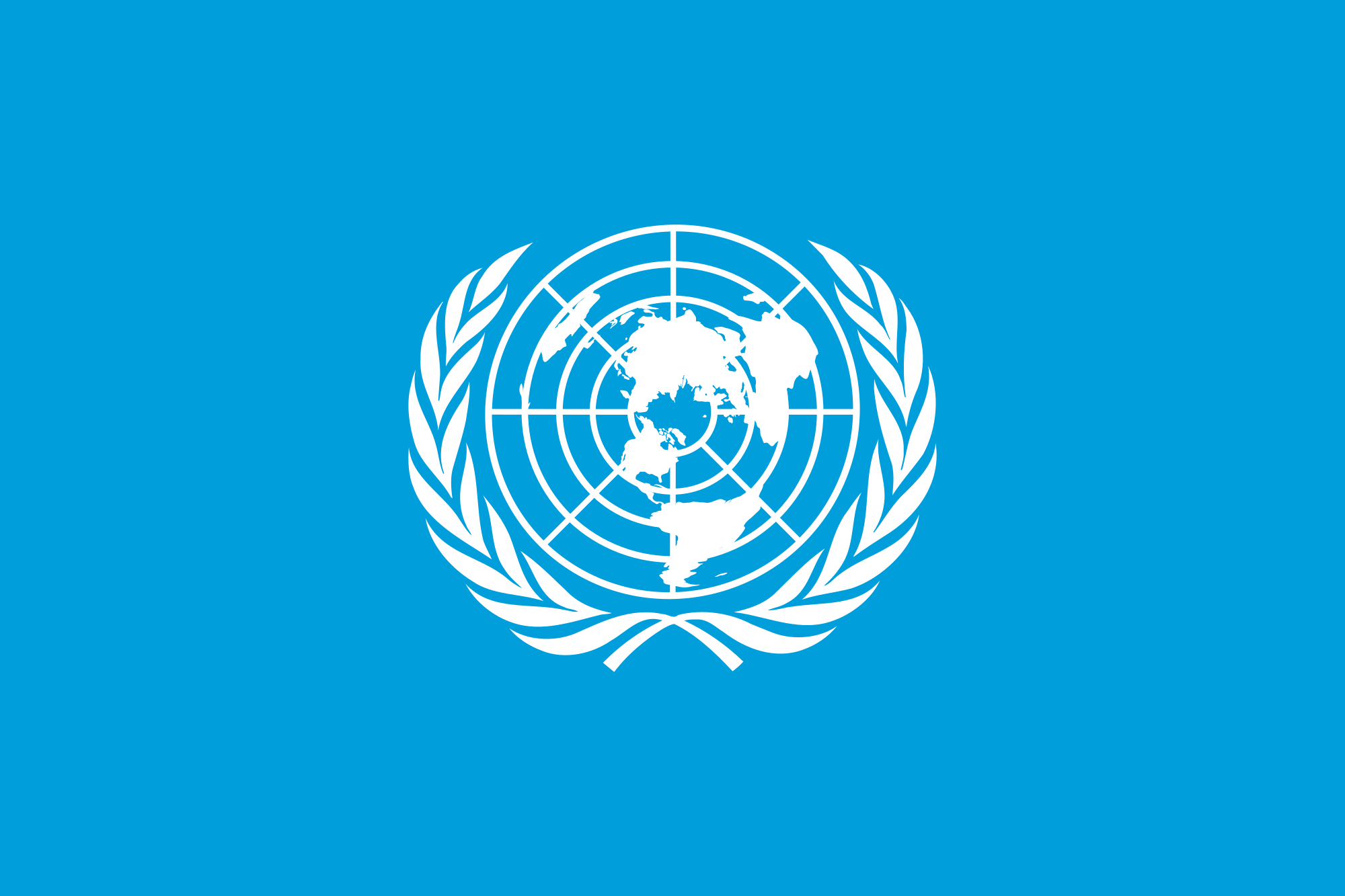More languages
More actions
(→Security Council: temporary members) Tag: Visual edit |
(Security Council) Tag: Visual edit |
||
| Line 24: | Line 24: | ||
=== Security Council === | === Security Council === | ||
The | The Security Council (UNSC) has five permanent members: [[China]], [[France]], [[Russia]], the [[United Kingdom of Great Britain and Northern Ireland|United Kingdom]], and the [[United States of America]]. While China, Russia, and the USA clearly represent important participants in global politics, France and the UK's presence has declined since the start of the UN. [[Muammar Gaddafi|Qaddafi]], [[Kofi Annan]], [[Recep Tayyip Erdoğan|Erdoğan]], and others have criticized the UNSC for not including more important countries such as [[Republic of India|India]] and [[Federative Republic of Brazil|Brazil]]. Two of the permanent members of the Security Council, Britain and France, are minor powers with populations of less than 70 million each. The most important European country in economic terms is [[Federal Republic of Germany|Germany]], which is not on the UNSC.<ref>{{Web citation|author=[[Vijay Prashad]]|newspaper=[[The Tricontinental]]|title=Shouldn’t the United Kingdom and France Relinquish Their Permanent Seats at the United Nations?: The Thirty-Ninth Newsletter|date=2023-09-28|url=https://thetricontinental.org/newsletterissue/unsc-permanent-membership/|retrieved=2023-10-01}}</ref> | ||
In 1965, the UN increased the number of temporary members in the security council to ten: five from [[Africa]] and [[Asia]], two from [[Latin America]], one from [[Eastern Europe]], and two from Western Europe. However, these non-permanent members have no veto power.<ref name=":122">{{Citation|author=[[Vijay Prashad]]|year=2008|title=The Darker Nations: A People's History of the Third World|chapter=Belgrade|page=103|pdf=https://cloudflare-ipfs.com/ipfs/bafykbzaceascnzh26r5d6uitjjs2z7rflhaxlt7rboz5whzdf76qg6xxvecqq?filename=%28A%20New%20Press%20People%27s%20history%29%20Vijay%20Prashad%20-%20The%20darker%20nations_%20a%20people%27s%20history%20of%20the%20third%20world-The%20New%20Press%20%282008%29.pdf|publisher=The New Press|isbn=9781595583420|lg=https://libgen.rs/book/index.php?md5=9B40B96E830128A7FE0E0E887C06829F}}</ref> | In 1965, the UN increased the number of temporary members in the security council to ten: five from [[Africa]] and [[Asia]], two from [[Latin America]], one from [[Eastern Europe]], and two from Western Europe. However, these non-permanent members have no veto power.<ref name=":122">{{Citation|author=[[Vijay Prashad]]|year=2008|title=The Darker Nations: A People's History of the Third World|chapter=Belgrade|page=103|pdf=https://cloudflare-ipfs.com/ipfs/bafykbzaceascnzh26r5d6uitjjs2z7rflhaxlt7rboz5whzdf76qg6xxvecqq?filename=%28A%20New%20Press%20People%27s%20history%29%20Vijay%20Prashad%20-%20The%20darker%20nations_%20a%20people%27s%20history%20of%20the%20third%20world-The%20New%20Press%20%282008%29.pdf|publisher=The New Press|isbn=9781595583420|lg=https://libgen.rs/book/index.php?md5=9B40B96E830128A7FE0E0E887C06829F}}</ref> | ||
In 2005, Kofi Annan proposed expanding the Security Council to 25 members, including six permanent members: two from Africa, two from Asia and the [[Oceania|Pacific]], one from Europe, and one from America. | |||
=== Economic and Social Council === | === Economic and Social Council === | ||
Revision as of 21:50, 1 October 2023

The United Nations (UN) is an international organization founded in 1945 as a successor to the League of Nations. Currently made up of 193 member states, the UN and its work are guided by the purposes and principles contained in its founding charter.[1] Despite its claim to work for peace, one of its first actions was to declare war on Korea to install a dictatorship over the south. Its initial years were spent as a mouthpiece of the United States of America and its allies until the Soviet Union began to participate in the UN. Despite it being seen as problematic by many, it has so far has not witnessed another World War, whether due to its presence or not.
Wars
Korean War
The UN sent troops to fight in the Korean War in 1950.
Congo Crisis
In 1960, Prime Minister Patrice Lumumba asked for assistance to stop Belgium from meddling with the Congo, which was its former colony. The UN sent military forces, but they overthrew Lumumba instead of helping him and blocked aid from the Soviet Union.[2]
Gulf War
During the reactionary coup in the Soviet Union, which later resulted in the creation of the Russian Federation, the imperialist countries leaped on the opportunity to use the UN to give legitimacy to their invasion of Iraq in 1990. The UNSC gave permission for the United States and its allies to use force for the second time in the UN's history.
General Assembly Resolutions 3379 & 46/86
United Nations General Assembly Resolution 3379, adopted on 10 November 1975 by a vote of 72 to 35 (with 32 abstentions), "determine[d] that Zionism is a form of racism and racial discrimination".
United Nations General Assembly Resolution 46/86, adopted on 16 December 1991, revoked the determination in Resolution 3379.
United Nations organs
The United Nations consists of six principal organs: the General Assembly, Security Council, Economic and Social Council, Trusteeship Council, International Court of Justice, and the Secretariat.
General Assembly
Security Council
The Security Council (UNSC) has five permanent members: China, France, Russia, the United Kingdom, and the United States of America. While China, Russia, and the USA clearly represent important participants in global politics, France and the UK's presence has declined since the start of the UN. Qaddafi, Kofi Annan, Erdoğan, and others have criticized the UNSC for not including more important countries such as India and Brazil. Two of the permanent members of the Security Council, Britain and France, are minor powers with populations of less than 70 million each. The most important European country in economic terms is Germany, which is not on the UNSC.[3]
In 1965, the UN increased the number of temporary members in the security council to ten: five from Africa and Asia, two from Latin America, one from Eastern Europe, and two from Western Europe. However, these non-permanent members have no veto power.[4]
In 2005, Kofi Annan proposed expanding the Security Council to 25 members, including six permanent members: two from Africa, two from Asia and the Pacific, one from Europe, and one from America.
Economic and Social Council
Trusteeship Council
International Court of Justice
Secretariat
References
- ↑ "About Us". United Nations. Archived from the original on 2022-05-30.
- ↑ Daniel Morley (2016-01-15). "The United Nations: a tool of imperialism" Socialist Appeal. Archived from the original on 2018-06-17. Retrieved 2022-06-05.
- ↑ Vijay Prashad (2023-09-28). "Shouldn’t the United Kingdom and France Relinquish Their Permanent Seats at the United Nations?: The Thirty-Ninth Newsletter" The Tricontinental. Retrieved 2023-10-01.
- ↑ Vijay Prashad (2008). The Darker Nations: A People's History of the Third World: 'Belgrade' (p. 103). [PDF] The New Press. ISBN 9781595583420 [LG]
